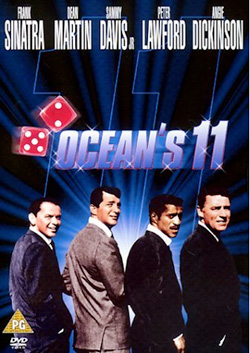 | |
 Now playing: Slate V, a video-only site from the world's leading online magazine. Visit Slate V at www.slatev.com. Now playing: Slate V, a video-only site from the world's leading online magazine. Visit Slate V at www.slatev.com. | |
culturebox 50 Years of Rat Packing How an OK movie and a circle of drinking buddies became an iconic American attitude. Posted Thursday, Aug. 19, 2010, at 6:14 PM ET
To get the ring-a-ding-ding of the idea, we need to travel back to the mid-1950s and to 232 South Mapleton Dr. in Los Angeles, where Humphrey Bogart was slow to get around to decorating his living room. During his 50s, Bogart and Lauren Bacall, his fourth and best wife, held court in Holmby Hills, a neighborhood tucked between the Bel Air and Los Angeles country clubs.* Unless they were throwing a great big do, they hosted their guests in a cozy library--the Butternut Room--featuring well-stocked bookcases and a better-stocked bar. Spencer Tracy (or whoever) would drop in, have a laugh, and eat late dinner off of folding tables. Regular visitors considered themselves show-business outsiders--a curious claim to be made by a group including Hollywood's biggest movie star, its sharpest agent (Swifty Lazar), and the proprietor of its most prominent canteen (Michael Romanoff). But many narratives appoint rogues as their central heroes, and it is easy to claim not to care what people think of you when many people think you're the tops. To continue reading, click here. Troy Patterson is Slate's television critic.Join the Fray: our reader discussion forum What did you think of this article? POST A MESSAGE | READ MESSAGES Also In Slate Shafer: Who Cares That 18 Percent of Americans Think "Obama's a Muslim"? Are Twentysomethings Really as Pathetic as the New York Times Says? The Switch: A Sappy, Formulaic Movie That Could Have Been Scruffy and Tender | Advertisement |
Manage your newsletters on Slate Unsubscribe | Newsletter Center | Advertising Information | |
Ideas on how to make something better? Send an e-mail to newsletters@slate.com. | |
Culturebox: 50 Years of Rat Packing
Subscribe to:
Post Comments (Atom)

No comments:
Post a Comment